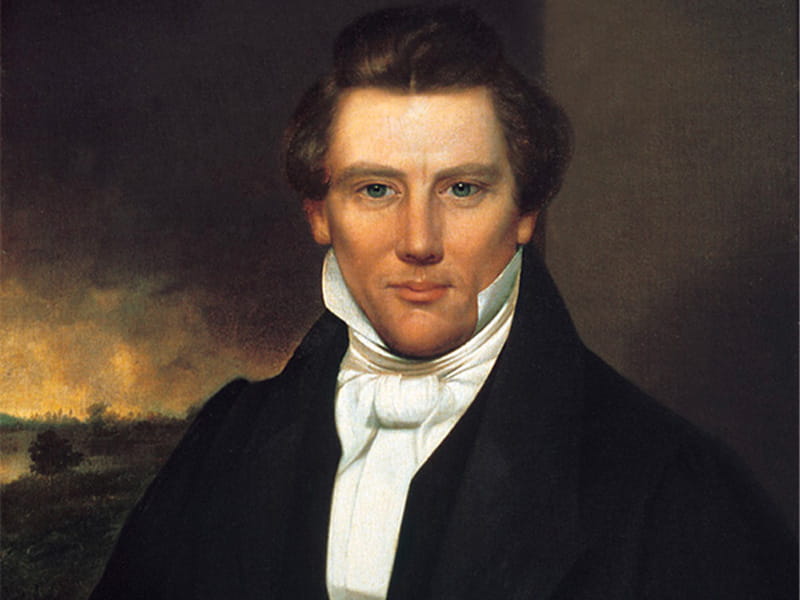Most American Mormon congregations give a nod to July 4 in Sacrament Meeting by singing a patriotic hymn or two on the Sunday closest to it. On the Sunday nearest "Pioneer Day"--July 24, the day the first Mormon pioneers entered the Salt Lake Valley--many offer talks about the dedication and sacrifice of the pioneers, or songs sung by the congregation. Often there's a picnic or a ward parade, with Radio Flyers turned into covered wagons and 19th-century costumes aplenty. Both the fourth and the twenty-fourth are fun and festive days.
 |
 |
 |
 |
| |||
 |
But I have my limits.
My first song boycott occurred quite spontaneously a few years ago on, I believe, the third of July. Aroused by patriotic fervor and not by the chorister's direction, the ward stood as one as the organist began the opening bars of "The Star Spangled Banner." Normally, the ward's singing was pretty typical of Mormon congregations--music sung in parts (which is nice), but wanly. I was so startled by the standing, the enthusiasm, the conviction!
Was this the same group of folks who slogged through the sacrament song just a few minutes ago?
I stood up by reflex with the rest and had sung my way through "the rocket's red glare" when something started bothering me. Why are we standing for this song? If we stand for this song, why not for the sacrament song which really should mean more to us, engender more deep feelings, and seize us more dramatically than a song about our country, however free and brave it is?
Whose meeting is this, anyway?
Of course, the meeting belongs to Jesus. Sacrament Meetings are intended to focus on Him, to be an offering to Him, our opportunity to examine the effects of the atonement of Christ in our lives. As the name indicates, Sacrament Meeting's function is to share the communal meal in remembrance of Christ's death on the cross for us all. As we eat and drink, we "take His name upon us" and "always remember Him and keep His commandments," with the promise that we will always have "His spirit to be with us." All the rest of the meeting--remarks from the bishop, the talks by ward members or ecclesiastical guests, the special musical numbers, the announcements, business, and benedictions--all the rest is garnish. It shouldn't be competition.
And, as grateful as I may be for the valuable contributions and service provided by our prophets, from Joseph Smith on down--and I AM grateful--I won't sing heroic songs in their honor at a Sacrament Meeting. I just can't justify singing praise to anyone other than Christ in a Sacrament Meeting.
 |
 |
 |
 |
| |||
 |
There is a whole raft of songs in our hymn book that may not focus directly on the atonement but which I'm willing to sing in Sacrament Meeting.
That's because they don't offer substitute people or objects of veneration. Though the lyrics and music make me chuckle with their swells and sentiments, there's something rousing about singing the "do good" songs. For example, the pioneer image of wagon wheels carries on in the cheery didactic of "Put your shoulder to the wheel; push along (push along) / Do your duty with a heart full of song, (full of song) / We all have work; let no one shirk. Put your shoulder to the wheel."
There are other songs that I have trouble singing in any meeting. In some, I just drop a few measures when the theology seems scary ("Angels above us are silent notes taking of every action; then do what is right!"). Then there are songs from the family homage batch that are challenging to sing without cracking up or weeping. In the song "Love at Home," I'd like a cottage where "hate and envy ne'er annoy," but the image in the next line--"Roses blood beneath our feet"--sounds prickly. For many people I love, the inner anguish at not finding "bliss complete" in their families is excruciating. Singing those lyrics and knowing their hearts is too jarring. The family--an institution deserving stewardship, covenant, and commitment--is still not something to worship. The first commandment seems pretty concise on that.
When I sing with the saints in Sacrament Meeting, I want to sing with intention and integrity. I want to focus on my Savior. I prefer to have an impulse afterward to shout "Amen!" and not "Play Ball!"

